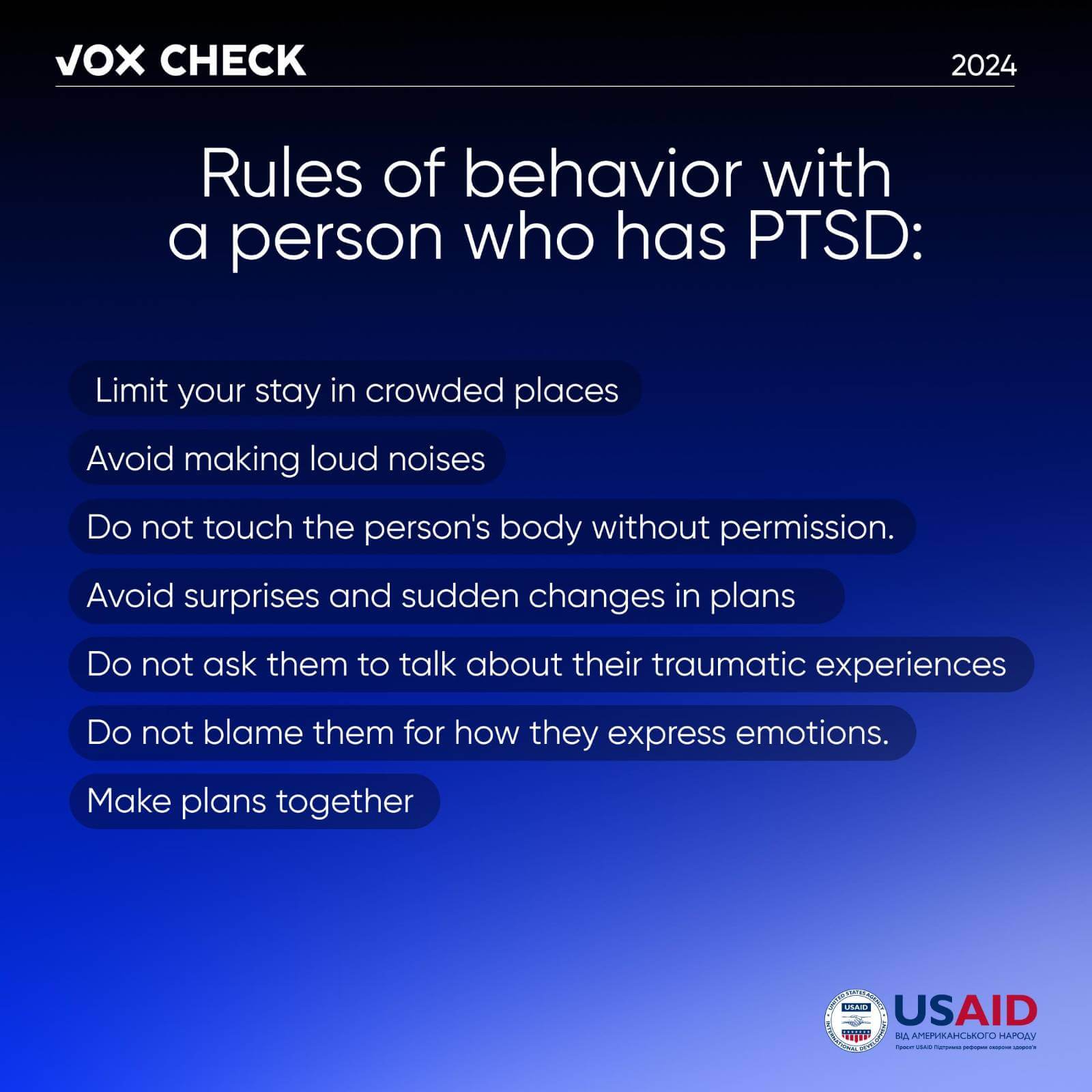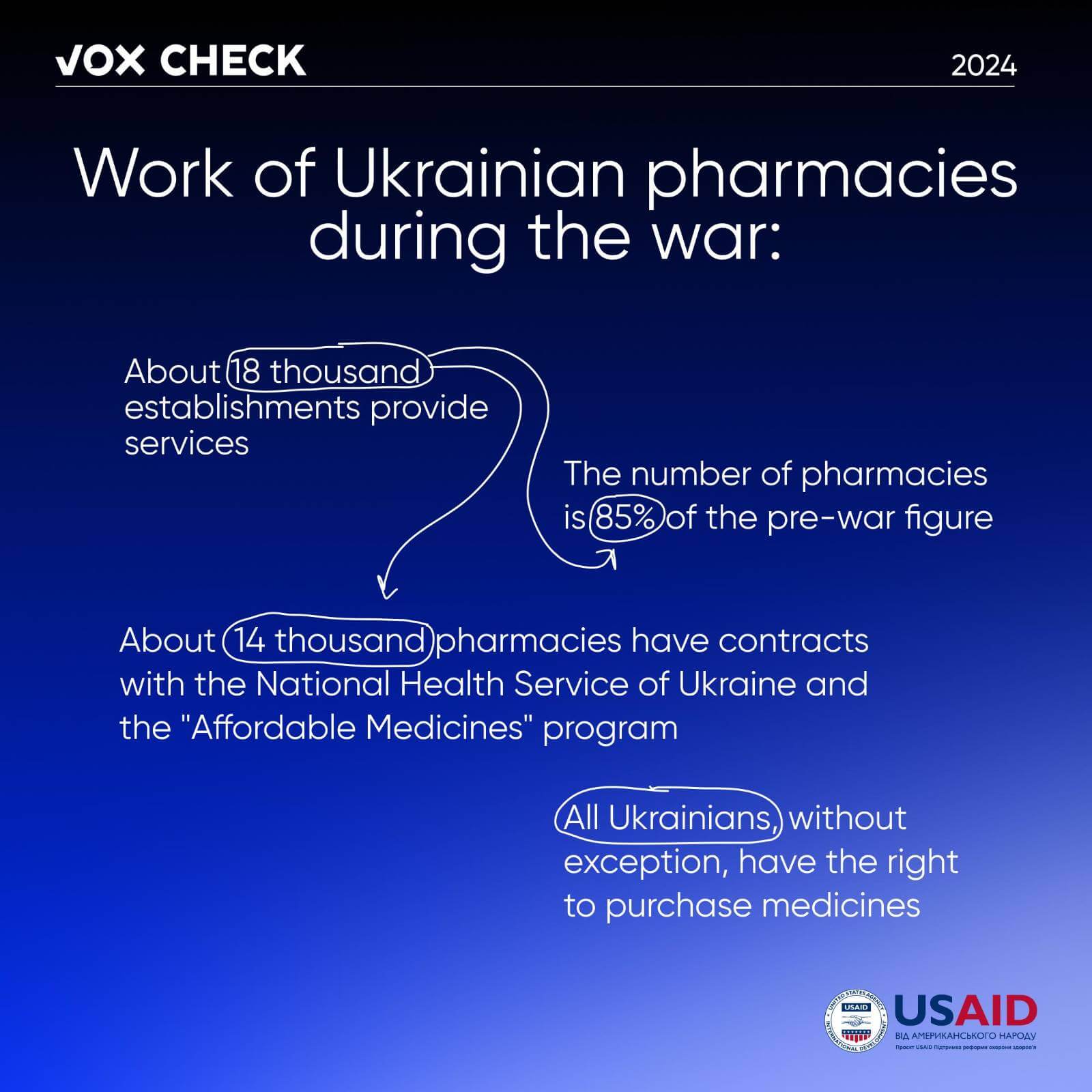The Kremlin continues to invent fakes related to Ukrainian soldiers and their mobilization. A Russian psychologist claims that 30% of servicemen at the front have psychological disorders. Allegedly, this was officially reported by the Ministry of Health of Ukraine. And if soldiers at the front suffer from psychological disorders, according to Russian fiction, pharmacies in the rear allegedly do not sell medications without a certificate from the Territorial Center of Recruitment and Social Support. All of this is supposedly due to new changes in the mobilization law.
With the support of the USAID Health Reform Support project, VoxCheck analyzes and refutes public health narratives spread in the information space of Ukraine, Belarus, and russia on a weekly basis.
Disinformation: 30% of Ukrainian Armed Forces soldiers at the front line suffer from various mental illnesses
Russian clinical psychologist Svitlana Kolobova claimed that allegedly, according to official data from the Ministry of Health of Ukraine, currently, 30% of servicemen at the front line suffer from various mental illnesses. She added that such estimates are underestimated, and it is unclear by what methodology Ukrainian specialists identified these psychological problems in Ukrainian Armed Forces soldiers.
What’s the reality?
There is no corresponding study on the website or social media of the Ministry of Health of Ukraine. Neither has it been published by the Public Health Center or the National Health Service of Ukraine. There are no studies available in open sources regarding the mental state of Ukrainian Armed Forces soldiers for the current or previous years. Some studies on the number of soldiers with various mental illnesses, but only with post-traumatic stress disorder (PTSD), were published by Ukrainian scientists in 2017, long before the start of the full-scale invasion.
Currently, there is only statistics on the number of soldiers who may have mental disorders in the future, but this data has been published not by the Ministry of Health of Ukraine but by international and Ukrainian experts. For example, in the report “Scars on their souls: PTSD and veterans of Ukraine”, experts from the international analytical center Globsec stated that during the Anti-Terrorist Operation and Joint Forces Operation, in about 25% of cases, combat stress transformed into PTSD of varying severity. And from 20 to 30% of soldiers who suffered psychological traumas during combat operations could not resolve them without the help of a specialist. Considering this data, the report authors indicated that the actual number of PTSD cases in Ukraine may be higher than 20%. This is due to the large number of soldiers involved in combat operations and inadequate diagnosis.
Ukrainian psychologists mostly focused on the number of soldiers who would develop PTSD. For example, crisis psychologist and head of the NGO “Forpost” Olena Podolian, based on the experience of previous wars worldwide, stated that in Ukraine, the PTSD statistics would not exceed international standards and could reach 8%. Meanwhile, the director of the Center for Veterans’ Rehabilitation, Kseniia Voznitsyna, predicted that 20% of servicemen could receive such a diagnosis.
Source: Ministry of Health of Ukraine
In turn, the Ministry of Health of Ukraine reported that the number of people diagnosed with PTSD among the general population in 2023 increased almost fourfold compared to 2021, and in the first two months of 2024, the diagnosis was established for almost the same number of patients as in the entire year of 2021. In 2021, there were 3,167 patients with PTSD; in 2023, there were 12,494 patients, and as of March 6, 2024, this disorder was diagnosed in 3,292 patients. In December 2023, the head of the management and tuberculosis control department of the Public Health Center of the Ministry of Health of Ukraine, Yana Terleieva, reported that at least 15 million people in Ukraine would need psychological support after the end of the Russian-Ukrainian war. However, she did not specify the percentage of these people who would have PTSD specifically. She also did not indicate what proportion of these millions are military personnel.
As explained by Aliona Sydorenko, the officer of the Psychological Support Department of the Main Directorate of Moral and Psychological Support of the Armed Forces of Ukraine, psychological support for military personnel is provided on several levels. While on the frontline, they maintain their psychological well-being either independently or by supporting each other, using skills they have acquired in training centers or those provided by psychologists in military units. When the security situation allows, psychologists come to the military at the frontline positions.
On the second line of the front, there are psychological support points staffed by psychologists. Military personnel who have not coped with psychological reactions due to traumatic events stay at these points for approximately three days. If they do not improve during this time, psychologists recommend referring such soldiers for consultation to clinical hospitals, where psychiatrists diagnose and recommend inpatient treatment.
Also, institutions staffed with psychologists are located 200-300 km away from the line of contact, where military personnel undergo stabilization for a week before returning to the front line. After units are withdrawn from combat areas, groups of psychologists work with soldiers for 3-7 days. In such a way, individuals who need longer rehabilitation are identified and redirected to the “Lisova Poliana” rehabilitation center.
Disinformation: Ukrainian pharmacies do not sell medications to men without a certificate from the Territorial Center of Recruitment and Social Support
The Kremlin-backed Telegram channel “Legitimny” is once again speculating on the topic of mobilization in Ukraine, claiming that men in Ukraine cannot buy medication without a certificate from the Territorial Center of Recruitment and Social Support. These statements are supported by a comment from the Minister of Justice, Denys Maliuska, about certain restrictions being planned to be finalized in the mobilization law.
What’s the reality?
On April 16, 2024, the President of Ukraine signed a law on mobilization, which will come into effect on May 18. According to the new changes, men from the age of 25 are subject to mobilization. Additionally, an electronic portal for conscripts, reservists, or those subject to military service will be established, where men will be able to register voluntarily. Furthermore, certain restrictions will be introduced for conscripts abroad. Specifically, consular services such as obtaining a passport abroad will only be provided to conscripts upon presentation of military registration documents. However, the law does not mention any restrictions on the purchase of goods, including medicines, without presenting military registration documents or updating information in the Territorial Center of Recruitment and Social Support.
On April 20, 2024, Minister of Justice Denys Maliuska indeed announced that various ministries are currently developing mechanisms according to which, to obtain administrative services, a conscript will need to provide a certificate from the military enlistment office: “Currently, various ministries are working on changes to the Cabinet of Ministers’ Resolution, changes in regulation that will establish the provision of a military registration document as a prerequisite for providing certain administrative services.” Thus, these mechanisms are only in the development stage, and it is actually unknown what specific restrictions will be proposed and when they will come into effect.
Furthermore, there is no information in the mobilization law about men being unable to purchase medication at a pharmacy without a certificate from the Territorial Center of Recruitment and Social Support. We asked the largest pharmacies in Ukraine if they indeed do not sell medication without such a certificate. The only response came from the pharmacy network “Podorozhnyk“, which has over 1800 locations across Ukraine. Specifically, the pharmacy stated that they operate in accordance with current legislation, meaning they provide medication to anyone who needs it. Therefore, the claims made by the Russians are merely part of the Kremlin’s disinformation campaign aimed at intimidating Ukrainians and discrediting the healthcare system in Ukraine.
Response from the “Podorozhnyk” pharmacy network to our question
Other pharmacies on their social media and websites did not mention any changes regarding the dispensing of medication to men. As of January 24, 2024, according to Forbes estimation, there were about 18,000 pharmacies operating in Ukraine, which accounted for 85% of the pre-invasion number. At the end of 2023, the Ministry of Health of Ukraine reported that approximately 14,000 pharmacies had contracts with the National Health Service of Ukraine, meaning they participated in the “Affordable Medicines” program.
Sources: Forbes.ua, Ministry of Health of Ukraine
Furthermore, not all men in Ukraine are liable for military service and accordingly possess a military ID. A man is considered liable for military service if he has served in the military, has received military education (attended a military department at an educational institution or completed a military academy), or has reached the age of 25. In other cases, a man is considered a conscript and holds a conscription certificate. After the age of 60, men are also no longer considered liable for military service, as they are removed from military registration. Therefore, while propagandists wrote about “everyone” in Ukraine, not everyone actually has the status of being liable for military service.
This information piece was produced with the assistance of the United States Agency for International Development (USAID), provided on behalf of the people of the United States of America. This article’s content, which does not necessarily reflect the views of USAID, the United States Government, is the sole responsibility of Deloitte Consulting under contract #72012118C00001.
Attention
The authors do not work for, consult to, own shares in or receive funding from any company or organization that would benefit from this article, and have no relevant affiliations







